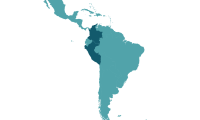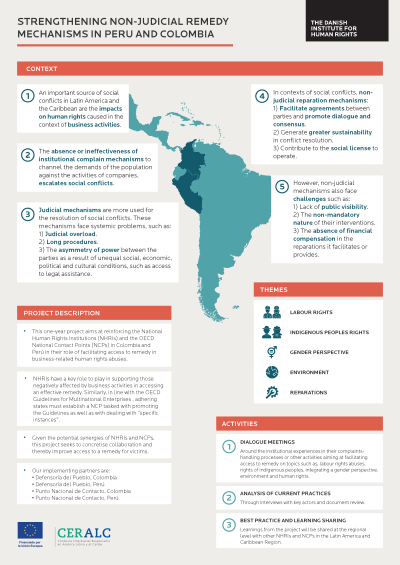Strengthening non-judicial remedy mechanisms in Peru and Colombia

The difference we make
National human rights institutions (NHRIs) have a key role to play in supporting those negatively affected by business activities in accessing an effective remedy. In line with the OECD Guidelines for Multinational Enterprises, adhering states have to establish a National Contact Point tasked with promoting the Guidelines as well as with dealing with “specific instances”.
Cognisant of the potential synergies of NHRIs and NCPs, the Global Alliance of NHRIs (GANHRI) and the OECD have signed a Memorandum of Understanding to promote further collaboration between the institutions.
Through this project, we are aiming to concretise collaboration and thereby improve access to remedy for victims.
Activities
The project will involve a series of dialogue meetings between the various institutions on a number of topics that the institutions deal with as part of their complaints-handling processes or other activities aiming at facilitating access to remedy. Themes will include for example: labour rights abuses, rights of indigenous peoples, integrating a gender perspective, environment and human rights.
An analysis of current practices of each institution will be carried out through interviews and document review. Learnings from the project will be shared at the regional level with other NHRIs and NCPs in the Latin America and Caribbean Region.
Implementation
The project has finished the series of dialogue meetings amongst the partners and other actors invited. Different methodologies were applied for each meeting (e.g. a conference by an expert; case analysis; discussion; etc). These dialogues allow to identify the practices and experience of the participants in addressing business and human rights issues and to understand how they contribute (directly or indirectly) to access to remedy.
Three dissemination events will be held to hare with the NHRIs and NPC from the LAC countries and civil society organisations the results.
Dissemination events
Regional Webinar for the socialization of results
On May 17, 2022, a webinar was held to socialize and exchange the results of the project "Strengthening non-judicial state mechanisms for access to redress in business and human rights (INDH and PNC-OECD) in Colombia and Peru”, in which more than 50 staff members from the National Human Rights Institutions and the OECD National Points of the Latin American region participated.
The event featured opening remarks by Alexia Ghyott, from the Office of the High Commissioner for Human Rights; Germán Zarama, Focal Point for Latin America of the OECD and Alvaro Amaya, Regional Representative for Latin America and the Caribbean of the Danish Institute of Human Rights.
In this framework, the main conclusions of the project were presented to the attendees and motivated the discussion on the advances, practices and challenges of the non-judicial mechanisms of judicial claim around the following topics: labour rights; rights of indigenous peoples; gender dimensions; the right to a healthy environment, and the reparations. As a result of this webinar, the experiences of the participants in the project were made known at the regional level and additional information was identified on the trends in the work of non-judicial mechanisms in business and human rights matters in the region.
Workshops with civil society organisations
On May 24 (Colombia) and 26 (Peru) 2022, two workshops were held to disseminate results of the project with civil society organisations (trade unions, indigenous peoples' organisations, NGOs, among others).
In each of the workshops, the NHRI and the NCP of the corresponding country had the opportunity to explain the scope of their mandate and their experience as a non-judicial mechanism for reparation in human rights and business matters. In turn, the attending organisations were able to express and share their reflections and contributions in relation to access to non-judicial redress mechanisms and make recommendations in this regard.
Reports
As a result of the exchange sessions and the analysis of secondary sources, five reports were produced that analyse the developments, challenges and opportunities of the NHRIs and the National Points of the OECD in addressing complaints, cases or specific instances in the matter of human rights and business, in relation to specific topics.
Please note, the reports are only available in Spanish:
- Los derechos de los pueblos indígenas y el acceso a mecanismos no judiciales de reclamación en derechos humanos y empresas
- Los derechos laborales y el acceso a mecanismos no judiciales de reclamación en derechos humanos y empresas
- Dimensiones de género en el acceso a mecanismos no judiciales de reclamación en derechos humanos y empresas
- Medio ambiente y el acceso a mecanismos no judiciales de reclamación en derechos humanos y empresas
- La reparación y el acceso a mecanismos no judiciales de reclamación en derechos humanos y empresas
Partners
- Defensoría del Pueblo, Colombia
- Defensoría del Pueblo, Perú
- Other actors invited:
- National Contact Point OCDE, Colombia,
- National Contact Point OCDE, Perú
Funding
This project is funded through the Project “Responsible Business Conduct in Latin America and the Caribbean”, jointly implemented by the OHCHR, the ILO and the OECD and funded by the European Union.

Start: 2021
End: 2022
